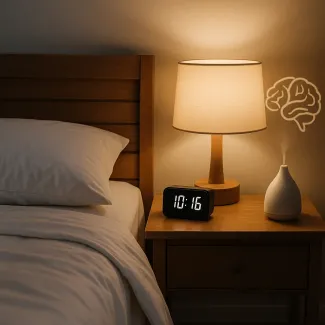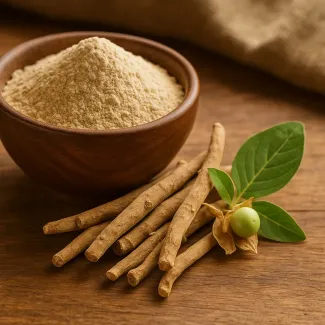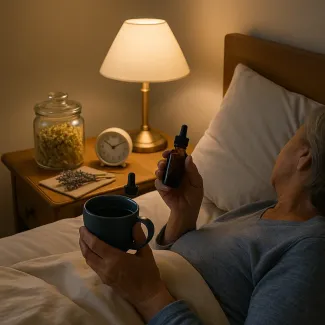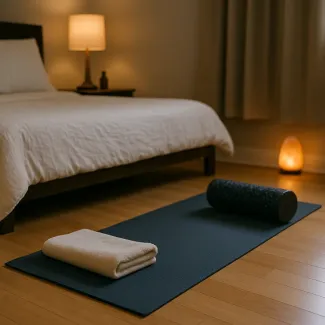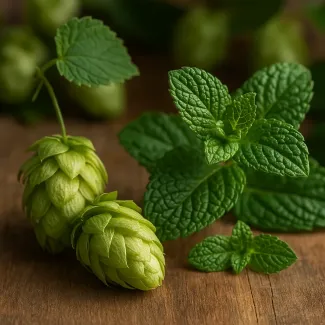
Discover the calming power of nature: how hops and peppermint support restful sleep and better digestion
Harness herbal relief for a calmer body and mind
When the day feels too long and the night too restless, many turn to natural remedies to restore balance. Two herbs, often overlooked in the shadow of pharmaceutical solutions, offer profound effects: hops (Humulus lupulus) and peppermint (Mentha piperita). These botanical allies have been trusted for centuries to soothe both the nervous system and digestive tract, making them powerful companions for those battling insomnia, tension, bloating, and digestive discomfort. Understanding how to use these herbs safely and effectively can make a noticeable difference in daily well-being.
Understanding the calming effects of hops on the nervous system
Hops are best known for their role in brewing, but they also have a deeply rooted tradition as a natural sedative. The same compounds that lend beer its characteristic aroma contribute to its calming properties.
What makes hops a natural sleep aid?
The lupulin glands of the hop plant contain essential oils and bitter acids, including humulone and lupulone, which act on the GABA receptors in the brain—these are the same neurotransmitters influenced by pharmaceutical sleep aids. The result is a gentle calming of the central nervous system, reducing anxiety, tension, and helping the body to transition into rest.
Unlike synthetic sleep medications that can cause dependency or morning drowsiness, hops offer a more balanced approach, supporting the body’s own rhythms without overriding them. Many who use hops extracts, tea, or capsules report falling asleep more easily and experiencing a deeper, more restorative sleep.
Best ways to use hops for sleep
The most effective method is consuming hops in the evening, approximately 30–60 minutes before bedtime. Some options include:
- Hops tea made from dried blossoms steeped in hot water
- Capsules or tinctures with a standardized dose
- Herbal sleep blends that combine hops with valerian root or passionflower for synergistic effects
- Aromatherapy pillows or sachets with dried hops placed near the pillow
Each method can be adapted based on personal preference. While the flavor of hops is quite bitter, its calming properties often outweigh its strong taste for those who need it most.
Who benefits most from hops?
Hops can be particularly beneficial for:
- People experiencing insomnia due to stress
- Those with difficulty falling asleep despite physical tiredness
- Individuals facing nervous restlessness or racing thoughts at night
- Adults with mild anxiety that interferes with daily life or sleep
- Women in perimenopause or menopause experiencing hormonal sleep disturbances
While generally safe, pregnant or breastfeeding women and individuals on sedative medication should consult with a practitioner before using hops consistently.
Peppermint: natural support for bloating, nausea, and digestive cramps
Known for its fresh, cooling aroma and taste, peppermint has long been used as a traditional remedy for indigestion and gastrointestinal upset. Modern usage continues to validate what ancient herbalists already knew: peppermint relaxes the smooth muscles of the gastrointestinal tract and relieves spasms, bloating, and gas.
How peppermint soothes the digestive system
Peppermint contains menthol, a volatile compound that directly influences the smooth muscle tissue in the stomach and intestines. By acting as a muscle relaxant, menthol helps reduce the spasmodic contractions that cause discomfort, cramping, and feelings of pressure.
This makes peppermint ideal for:
- Irritable bowel syndrome (IBS)-related symptoms
- Post-meal bloating and fullness
- Travel-related nausea
- Cramping during digestive episodes
- Functional dyspepsia or upper stomach discomfort
Effective forms of peppermint use
Peppermint is available in various forms, each with its own advantages:
- Peppermint tea, consumed after meals, is one of the most common and soothing choices
- Enteric-coated peppermint oil capsules, designed to release in the intestines rather than the stomach, are highly effective for IBS
- Peppermint essential oil used topically on the abdomen (diluted in carrier oil) can help ease bloating and cramping
- Peppermint lozenges or chewing gum can reduce nausea in motion sickness or early pregnancy
It’s important to avoid non-coated peppermint oil in cases of acid reflux, as it may relax the lower esophageal sphincter and worsen symptoms.
Combining hops and peppermint for holistic wellness
Both hops and peppermint complement each other when used in tandem. Where hops calm the mind and prepare the body for sleep, peppermint soothes the gut, which is often a source of discomfort that can interrupt restful sleep.
People who experience sleep disturbances due to digestive issues, especially nighttime bloating, benefit from combining peppermint tea with hops tincture or capsules. Likewise, those with stress-related digestive upset can use both herbs to calm their nervous system and stomach simultaneously.
This combination is especially helpful in:
- Stressful life periods where digestion and sleep are disrupted
- Menstrual cycles with both bloating and sleep disturbance
- Shift workers or people with irregular sleep patterns
- Post-holiday or heavy meals when the stomach is overloaded and sleep is elusive
Using both herbs supports the gut-brain axis, a system of communication between the nervous system and digestive system, helping to restore natural balance.
When to avoid hops or peppermint
Despite their benefits, some individuals may need to exercise caution:
- People with severe acid reflux or GERD may find peppermint worsens heartburn
- Hops may interact with CNS depressants or hormone-sensitive conditions
- Those with known allergies to either plant should avoid them in all forms
- Children and pregnant women should only use herbal remedies under supervision
It is essential to start with small doses and observe the body's response, especially when combining multiple herbs.
Supporting your sleep and digestion naturally
For those seeking alternatives to synthetic solutions, nature provides a pathway to healing. Hops gently encourage the body into rest without grogginess, while peppermint releases the tension that can grip the gut and create discomfort.
Restoring balance through plant-based support is not only possible—it can be profoundly effective. The key is consistency, quality sourcing, and choosing the right format for your body.
Many people find that simply introducing a bedtime tea with both herbs creates a ritual that signals rest. Others prefer morning peppermint capsules and evening hops tincture. The approach can be as individual as the symptoms.
Tailoring herbal routines for different needs
Because every body is different, experimenting with timing, dosage, and form is essential.
- For those with mild bloating, a peppermint tea after dinner may suffice
- If nervous insomnia is a problem, hops tincture at night can be helpful
- When digestion and sleep are both affected, a two-pronged approach works best: peppermint post-meal and hops pre-bed
Users often report benefits within a few days, though for chronic issues, a consistent approach over 2–3 weeks allows the herbs to regulate patterns.
Lifestyle factors to support herbal effects
Incorporating hops and peppermint works best alongside:
- A consistent sleep routine, going to bed and waking up at the same time daily
- Avoiding heavy evening meals or caffeine late in the day
- Using gentle abdominal massage or warm compresses to assist peppermint
- Establishing an evening wind-down routine with herbal tea, reduced screen time, and calm breathing
These simple habits enhance the natural properties of herbs and make their effect more profound over time.
Culinary and topical uses of peppermint and hops
Though best known in supplements and teas, both herbs can be used creatively:
- Add fresh peppermint to smoothies or water for refreshing taste and mild digestive support
- Infuse hops flowers into homemade salves or bath blends for a calming soak
- Blend dried peppermint into homemade herbal blends with chamomile and lemon balm
- Use hops pillows near the bed for aromatherapy-based sleep support
This makes it easier to build a holistic routine that incorporates herbs into everyday rituals rather than seeing them as one-off solutions.
Frequently asked questions about peppermint and hops
While every person’s body reacts differently, some common questions arise:
- How quickly do hops and peppermint work?
Peppermint may relieve bloating or nausea within 20–30 minutes. Hops may take longer, especially for sleep, typically 45–60 minutes before bedtime. - Can I use both herbs daily?
Yes. They are generally safe for daily use when used within recommended dosages. Listen to your body and adjust as needed. - Are there known interactions?
Hops can enhance the effects of sedatives or alcohol. Peppermint may interfere with certain medications due to liver metabolism. - Do I need to cycle or take breaks from them?
For ongoing issues like IBS or insomnia, it is good practice to assess every 4–6 weeks and pause for a few days if needed. - What age group can use these herbs?
Most adult users benefit from both. Children should only use them under guidance, especially peppermint essential oil.
Integrating plant medicine into modern life
Modern wellness trends are finally returning to what traditional medicine long embraced: plants can heal. In a fast-paced world full of synthetic solutions, the gentle power of herbs like peppermint and hops offers a welcome reprieve. Their ability to target two of the most common complaints—poor sleep and digestive imbalance—makes them invaluable additions to the home wellness toolkit.
By listening to the body and choosing herbs that support its rhythms, many find that they not only sleep better and digest more comfortably, but also feel calmer and more resilient in the face of daily stress. Consistency, quality, and mindful usage turn these simple plants into powerful allies for modern health.
